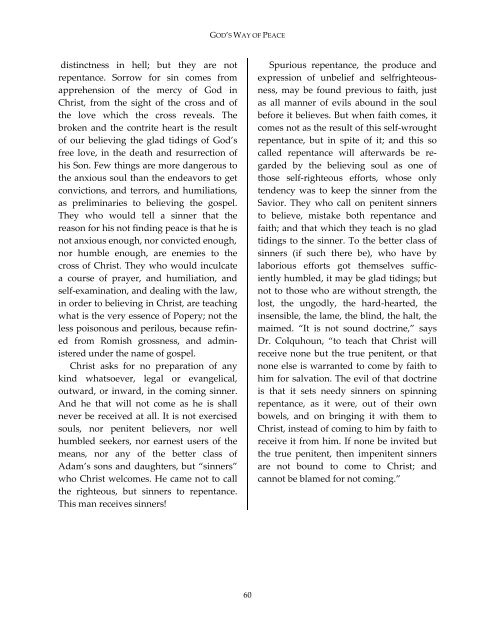God's Way of Peace by Horatius Bonar, D.D.
The seasoned Scottish pastor wrote this short devotional for those suffering from guilt, anxiety, or the consequences of sin. He writes with neither chastisement nor condemnation, but rather immediately directs his readers to Christ’s gift of salvation through his death and resurrection. Bonar reminds all that the Gospel offers hope for the sinner and comfort for the troubled, for God’s perfect, constant grace never fails those who accept it. From Bonar’s time to the present, people have found peace with God afresh through this book. Many people report having read it several times, and turning to it again and again when troubles arise. Kathleen O’Bannon CCEL Staff
The seasoned Scottish pastor wrote this short devotional for those suffering from guilt, anxiety, or the consequences of sin. He writes with neither chastisement nor condemnation, but rather immediately directs his readers to Christ’s gift of salvation through his death and resurrection. Bonar reminds all that the Gospel offers hope for the sinner and comfort for the troubled, for God’s perfect, constant grace never fails those who accept it. From Bonar’s time to the present, people have found peace with God afresh through this book. Many people report having read it several times, and turning to it again and again when troubles arise.
Kathleen O’Bannon
CCEL Staff
You also want an ePaper? Increase the reach of your titles
YUMPU automatically turns print PDFs into web optimized ePapers that Google loves.
GOD’S WAY OF PEACE<br />
distinctness in hell; but they are not<br />
repentance. Sorrow for sin comes from<br />
apprehension <strong>of</strong> the mercy <strong>of</strong> God in<br />
Christ, from the sight <strong>of</strong> the cross and <strong>of</strong><br />
the love which the cross reveals. The<br />
broken and the contrite heart is the result<br />
<strong>of</strong> our believing the glad tidings <strong>of</strong> God’s<br />
free love, in the death and resurrection <strong>of</strong><br />
his Son. Few things are more dangerous to<br />
the anxious soul than the endeavors to get<br />
convictions, and terrors, and humiliations,<br />
as preliminaries to believing the gospel.<br />
They who would tell a sinner that the<br />
reason for his not finding peace is that he is<br />
not anxious enough, nor convicted enough,<br />
nor humble enough, are enemies to the<br />
cross <strong>of</strong> Christ. They who would inculcate<br />
a course <strong>of</strong> prayer, and humiliation, and<br />
self‐examination, and dealing with the law,<br />
in order to believing in Christ, are teaching<br />
what is the very essence <strong>of</strong> Popery; not the<br />
less poisonous and perilous, because refined<br />
from Romish grossness, and administered<br />
under the name <strong>of</strong> gospel.<br />
Christ asks for no preparation <strong>of</strong> any<br />
kind whatsoever, legal or evangelical,<br />
outward, or inward, in the coming sinner.<br />
And he that will not come as he is shall<br />
never be received at all. It is not exercised<br />
souls, nor penitent believers, nor well<br />
humbled seekers, nor earnest users <strong>of</strong> the<br />
means, nor any <strong>of</strong> the better class <strong>of</strong><br />
Adam’s sons and daughters, but “sinners”<br />
who Christ welcomes. He came not to call<br />
the righteous, but sinners to repentance.<br />
This man receives sinners!<br />
Spurious repentance, the produce and<br />
expression <strong>of</strong> unbelief and selfrighteousness,<br />
may be found previous to faith, just<br />
as all manner <strong>of</strong> evils abound in the soul<br />
before it believes. But when faith comes, it<br />
comes not as the result <strong>of</strong> this self‐wrought<br />
repentance, but in spite <strong>of</strong> it; and this so<br />
called repentance will afterwards be regarded<br />
<strong>by</strong> the believing soul as one <strong>of</strong><br />
those self‐righteous efforts, whose only<br />
tendency was to keep the sinner from the<br />
Savior. They who call on penitent sinners<br />
to believe, mistake both repentance and<br />
faith; and that which they teach is no glad<br />
tidings to the sinner. To the better class <strong>of</strong><br />
sinners (if such there be), who have <strong>by</strong><br />
laborious efforts got themselves sufficiently<br />
humbled, it may be glad tidings; but<br />
not to those who are without strength, the<br />
lost, the ungodly, the hard‐hearted, the<br />
insensible, the lame, the blind, the halt, the<br />
maimed. “It is not sound doctrine,” says<br />
Dr. Colquhoun, “to teach that Christ will<br />
receive none but the true penitent, or that<br />
none else is warranted to come <strong>by</strong> faith to<br />
him for salvation. The evil <strong>of</strong> that doctrine<br />
is that it sets needy sinners on spinning<br />
repentance, as it were, out <strong>of</strong> their own<br />
bowels, and on bringing it with them to<br />
Christ, instead <strong>of</strong> coming to him <strong>by</strong> faith to<br />
receive it from him. If none be invited but<br />
the true penitent, then impenitent sinners<br />
are not bound to come to Christ; and<br />
cannot be blamed for not coming.”<br />
60

















